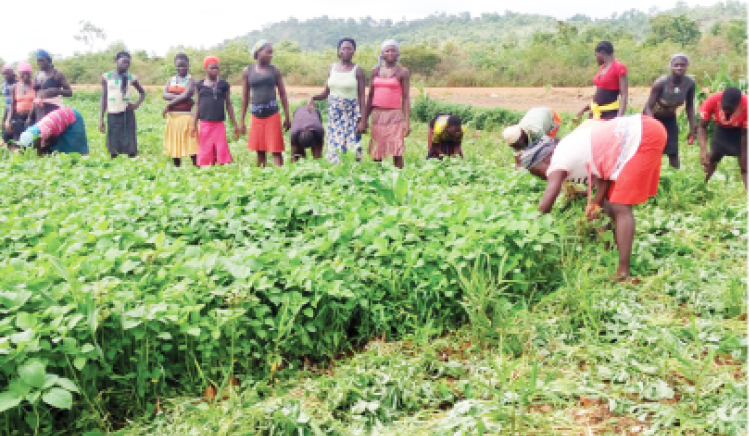More community women embrace modern agro-tech in Kano
At a time when farming is becoming more of a male dominated profession and more money consuming practice, several women in Kano communities are involved in imbibing agriculture as a profession. This development has been attributed to several attempts to include women in the newly adopted innovation in agricultural development projects across the nation. It […]

File photo: Women in a farm
At a time when farming is becoming more of a male dominated profession and more money consuming practice, several women in Kano communities are involved in imbibing agriculture as a profession. This development has been attributed to several attempts to include women in the newly adopted innovation in agricultural development projects across the nation.
It was however discovered that due to these agricultural development projects, more community women have embraced the newly introduced innovation in agricultural technology to boost their agricultural productivity, especially in the production of tomato, okra and other vegetables.
Findings have shown that the new innovation adopted entails the training of women on the use of improved seed varieties and the adoption of best agronomic practices in production as well as a good record keeping system that will minimize cost of production and maximize their productivity.
However, demo farms were established in selected communities within selected local government areas in the state to show the efficacy of the new methodology for replication in individual farms. Moreover, the demo farms were said to be strong catalysts that have changed the narrative in women involvement in agriculture in most of the selected communities.
This movement was initiated by the Dutch-funded HortiNigeria program, implemented through the International Fertilizer Development Center (IFDC) and its consortium partners East-West Seed Knowledge Transfer (EWS-KT), Wageningen University and Research (WUR) among others. The innovation has been working on several sectors to ensure a positive shift of vegetable production in some select states in Nigeria.
In the Zakarawa community of Garko Local Government Area, women were selected and trained to form a group that will cultivate okro. According to testimonies by members of the group, they have never had it so impressive as this rainy season as they have tripled their production on the same piece of land.
Malama Binta Dahiru, the lead farmer in the group, testified that women farmers are now motivated to wholeheartedly venture into farming because they have seen what the group had achieved through the newly adopted technology. “We have seen the differences between our previous mode of production and the newly adopted agricultural practice introduced to us. We had a very bumper harvest this year, and many women in this community have indicated their interest to join us next year,” she said.
Another female farmer Malama Harira Bello said she would have been a farmer decades ago had she known there were modalities like this. According to her, she has been engaged in farming activities but at subsistence level, not knowing that she can earn a living through farming in the same piece of land but with higher output.
“It is just like magic; we have been doing our thing for domestic usage not knowing that we can do it at a commercial level like this. I would have been a big farmer for long had I known this innovation,” she said.
The Program Director of HortiNigeria Mohammed Salasi Idris stated that the four-year program aims to support Nigeria in building a sustainable and gender- and youth-inclusive horticulture sector that contributes to nutritional and food security in the country, adding that the program has already started working with several stakeholders in Kaduna, Kano, Ogun and Oyo states, with focus on tomato, okro, onion, pepper, cabbage, cucumber, sweetcorn and watermelon value chains.
Similarly, the Director Marketing Development IFDC Madam Veryl Adele assured the farmers of her readiness to create a suitable market for the farmers that would encourage appreciable commodity prices, adding that her department is always ready to work with farmers in terms of market accessibility strategies, training on post-harvest losses, among others.
